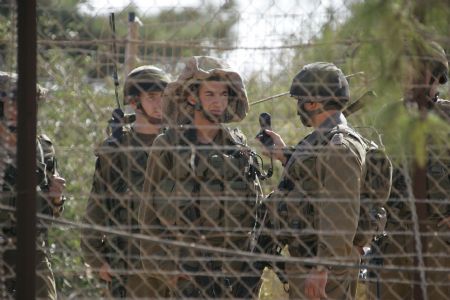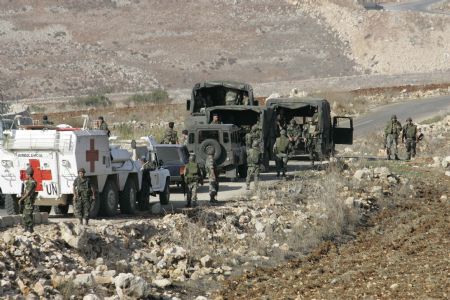Israel shows restraint after latest rocket launch from Lebanon
Future Israeli reaction
While Israel has responded with fire directed at the source of the strike on each occasion, it has not taken more drastic action. However, the Jewish state's defense chiefs often say they will do whatever is necessary in order to defend the country.
Pierre, who asked that his surname not be disclosed, was a senior officer in the Israeli-backed South Lebanon Army during the Lebanese civil war. Today he resides in Israel as do several of his former fighting colleagues.
Pierre believes Israel's minimal response was appropriate. The Katyusha attack was totally unexpected because on the whole the area has been calm of late. It is in Israel's best interest not to escalate the situation at the moment, he told Xinhua on Wednesday.
Part of the problem for Israel is knowing whom to target if it does choose to stage a wider retaliatory strike.
While Israel holds the Lebanese government to blame for failing to rein in armed organizations in the south of the country, that does not mean it can justify a large-scale counter attack.
"So the Katyusha attack was launched from southern Lebanon, does that mean we should attack gas stations, hospitals, power stations and that we take down the infrastructure of Lebanon?" said Eitan Azani, deputy director of the International Institute for Counter Terrorism at Israel's Interdisciplinary Center.
That is precisely what the militant groups are hoping Israel will do, Azani said. Israel would definitely take the collateral damage on board before taking significant military action. It would take a great amount of provocation to push Israel.
The last time Israel did send its forces into Lebanon was in July 2006, after Hezbollah operatives launched an attack on the Israeli side of the border, in which they killed three Israeli soldiers and captured two.
Since then questions have been asked in Israel and abroad about the nature of the Israeli response, with many suggesting it was disproportionate.
Israel would clearly like to see a total cessation of the attacks against its territory, but it is seemingly not 100-percentsure whom to target.
 |
|
Lebanese soldiers and U.N peacekeepers patrol a road in Houla village in south Lebanon October 28,2009. Lebanese army soldiers found and deactivated four rockets on Wednesday in the area from where a rocket had been fired towards northern Israel, witnesses said.[Xinhua] |
Whodunit mystery
There are three directions in which Israel should look when trying to ascertain the source of the Katyusha strikes, according to Azani: Hezbollah, Palestinian organizations and the Lebanese arm of global Jihad. All three have reasons to gain from inciting Israel, he claimed.
It is currently not in Hezbollah's interest to ratchet up the tension with Israel directly, Azani argued, adding that Tuesday's attack was not a part of the modus operandi of the Syrian- and Iranian-backed movement.
On the other hand, it is good for Hezbollah if residents of northern Israel do not have a full sense of security, he said. Doing that in a "drip-drip fashion" serves the purpose. Hezbollah could be doing this via a proxy or simply by turning a blind eye to things that happen within the territory it controls.
Palestinian groups based in Lebanon do not have major resources to hand but are capable of firing occasional rockets in Israel's direction, said Azani, adding that they do have an interest to do so, as do the Gaza-based Hamas and Islamic Jihad.
Such groups could also be operating at arm's length from Hezbollah, but with the knowledge of Hezbollah.
Global Jihad members in Lebanon are operating out of Palestinian refugee camps and the country's Sunni-dominated areas, said Azani. The movement has "considerable interest" in carrying out acts against Israel from Lebanese soil.
While Azani produced a series of reasons for including or excluding various organizations from the list of suspects, former Lebanese fighter Pierre spoke more from his instincts.
"I think it was Hezbollah because this area was under the full authority of Hezbollah, especially when it comes to security," Pierre said.
Either way, southern Lebanon remains a trouble spot, both for Israel and the ruling bloc in Lebanon's central government. While Israel and the U.S. say they would like to see an Israeli-Lebanese peace deal, the chances of that coming to fruition are negligible as long as armed groups continue to threaten Israel from southern Lebanon.
 |
|
Lebanese villagers harvest olives as U.N. peacekeepers patrol the border with Israel near Kfarkila village in south Lebanon October 28, 2009. Lebanese army soldiers found and deactivated four rockets on Wednesday in the area from where a rocket had been fired towards northern Israel, witnesses said.[Xinhua] |
 0
0 






